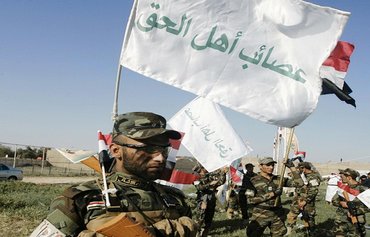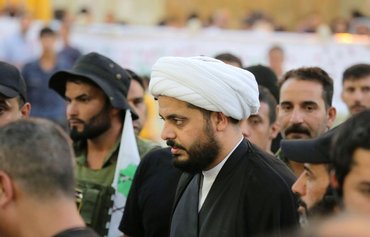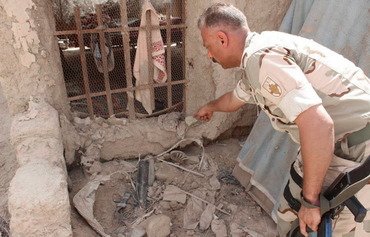Iraqi Prime Minister Mustafa Kadhemi has established a special committee to investigate the killing of eight civilians in Salaheddine province amid widespread public anger at what many Iraqis have called a "massacre".
A heavily armed force raided the village of Farhatiya in Balad district at dawn Saturday (October 17th) and kidnapped 12 young men, taking them to an unknown destination.
In the early morning hours, Salaheddine emergency police regiments uncovered eight bodies with marks of gunshots, while the fate of the remaining four men remains unknown.
The hashtags #Salaheddine_massacre #Farhatiya_massacre went viral over the weekend as outraged Iraqi social media users shared images of the executed civilians and accused armed militias of perpetrating the crime.
![Iraqis on October 18th held a minute of silence for the victims of the attack on the village of al-Farhatiya, Salaheddine province. [Photo courtesy of the Salaheddine Electricity Distribution Directorate]](/cnmi_di/images/2020/10/19/26611-Iraq-Salaheddine-killings-600_384.jpg)
Iraqis on October 18th held a minute of silence for the victims of the attack on the village of al-Farhatiya, Salaheddine province. [Photo courtesy of the Salaheddine Electricity Distribution Directorate]
Kadhemi, accompanied by senior officials, participated in a mourning reception on Sunday for the victims.
He said in a statement that the rights of the victims "will be upheld through the law", and that he is personally following up on the investigations that have been launched.
The perpetrators will be "punished by the courts and not by acts of revenge", he said, adding that the criminals will not escape justice.
Victims' families blame PMF
In addition to the government's investigative committee, Iraqi parliament speaker Mohammed al-Halbousi established a committee of members of the parliamentary security and defence committee to investigate the crime.
Both committees have begun conducting investigations and holding meetings with relevant parties, Shaalan al-Karim, the head of the Albu Issa tribe and a former MP from Salaheddine province, told Diyaruna.
"We are waiting for results to be reached and announced in the coming days," he said.
The victims' families and area residents have accused the Popular Mobilisation Forces' 42nd Brigade, a faction of the Iran-backed Asaib Ahl al-Haq militia, of being behind the crime, he noted.
"Eyewitnesses including relatives of the murdered individuals, local residents and members of the security force in charge of the area -- the Samarra Operations Command commando forces' 3rd Regiment -- have confirmed these accusations," said al-Karim.
The PMF have denied the accusations, pinning the blame on the "Islamic State of Iraq and Syria" (ISIS) in a statement Sunday.
"The force of the law will be applied to those involved, regardless of their affiliation," al-Karim said.
Multiplicity of security commands
"The Farhatiya crime is further proof of the danger of unregulated weapons and armed groups that do not obey the orders of the prime minister," al-Karim said, adding that this poses a major threat to national security.
He called for handing over security in Salaheddine to the Iraqi army and the local police, as well as to the tribal mobilisation, which consists of local residents.
The multiplicity of security commands and mobilisations deployed in Salaheddine does not serve the province's security, he said.
"Security responsibility in the province is today divided among three military commands: Salaheddine Operations Command, Samarra Operations Command, and the Control Centre Command in Kirkuk," he said.
Additionally, two PMF commands are present in the province: al-Salam Brigade within the Samarra Operations Command, and the mobilisation command in Salaheddine, said al-Karim.
The northern and southern Tikrit security branches of the National Security Service are active in Salaheddine as well, he added.
This presence of numerous security bodies has "negatively impacted the exchange of security information and has weakened control over security decision making in the province", he said.
Under Iraqi law, security in Salaheddine province lies within the purview of the governor, who is today "devoid of that authority", said al-Karim.

![Iraqi Prime Minister Mustafa Kadhemi and security officials on October 18th listen to the relatives of one of the victims of the massacre in Farhatiya, Salaheddine province. [Photo courtesy of the Prime Minister's media office]](/cnmi_di/images/2020/10/19/26609-Iraq-Salaheddine-victims-600_384.jpg)






